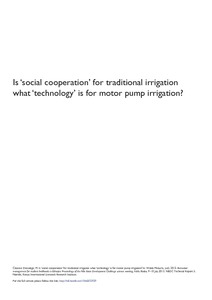Resource information
This paper calls attention to the importance of social cooperation in irrigation farming. It argues that a mere focus on the technical aspect of irrigation, disregarding its social aspects undermines the long-term benefits of irrigation to rural livelihoods. This assertion draws on lessons from small-irrigation practices in Fogera, in the Blue Nile Basin of Ethiopia, where I conducted fieldwork-based qualitative research. In recent years irrigation farming has drawn a growing interest among farmers in rural Fogera. Farmers practise small-scale irrigation that includes traditional irrigation and motor pump irrigation. Farmers assert that irrigation has brought farming benefits through cultivation of more crops as well as new crops that serve food and cash purposes. Such benefits have particularly spurred the enthusiasm for motor pump irrigation. However, the practice of motor pump irrigation largely relies on the motor-pump technology, overlooking the social scheme of irrigation. While traditional irrigation involves more social cooperation involving joint activities, water allocations and irrigation schedules, lack of social cooperation and such institutional conditions is widespread in motor pump irrigation. Local classification of irrigation practices also associate the mechanism of irrigation use and management including water use regulations and water use turns with traditional irrigation in contrast to motor pump irrigation. The neglect of social cooperation within current practices of motor pump irrigation will have significant adverse implications on long-term practices. Farmers have been already concerned about how competitions for water are growing, limiting the duration of water availability and creating water shortage. The study suggests that while farmers’ willingness to practise motor pump irrigation in Fogera has been stimulated by its livelihood benefits, sustained benefits of this irrigation scheme require social cooperation and feasible institutional conditions that can mediate water usage across user villages.



